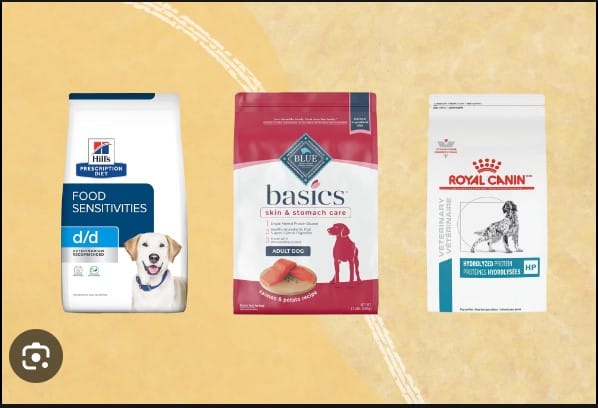Just like humans, dogs can have allergies too. These allergies can cause skin problems and can be caused by things in the environment or the food they eat. It’s crucial to be aware of what food is suitable for your dog if it has allergies. In this post, we have put together a list of the Best Food for Dogs with Allergies. We also talked about Common Symptoms of Food Allergy in your Dog and Diet Options for them. As well as Common Foods that Can Cause Dog Allergy and Dog Food with Few Ingredients.
Dogs can have allergies just like humans do. They can be allergic to things like grass, pollen, eggs, fabrics, and fleas. Surprisingly, their food is often the culprit behind allergies. Not keeping an eye on what they eat can lead to troublesome allergy symptoms. Many times, food allergies in dogs show up as itchy or irritated skin. Hence, excessive itching is a common reason why owners take their dogs to the vet. Since dogs can’t tell us if they have a food sensitivity or allergy, it’s important to know the common symptoms and also what to do if your dog is diagnosed with a food allergy.
See also: Best Dog Food for Skin Allergies
Common Symptoms of Food Allergy in your Dog
If your dog shows any of these signs, it might mean they have a food allergy. Also, you should take them to the vet for a checkup. They are
- Scratching
- Skin that’s red and irritated
- Rashes on the ears and paws
- Excessive gas
- Throwing up
- Loose or watery stools

Common Foods that Can Cause Dog Allergy
In theory, dogs can be allergic to any food. However, the six most common food allergies for dogs are beef, chicken, eggs, dairy, soy, and grains. You might wonder, “But dogs love chicken and beef!” That’s the exact reason why these are said to be a common cause of allergy. Mostly because they are frequently used in commercial dog foods. Thus, leading to more cases of allergies. Interestingly, the more often dogs eat something, the higher the chance they might develop an allergic reaction to it.
See also: 5 Toxic Foods To Avoid For Dogs
Diet Options for Dogs with Allergies
When choosing food for your dog with allergies, you can pick from two options: limited ingredient food or hypoallergenic food.
Limited Ingredient Food
Choosing diets with fewer ingredients can help you identify the specific ingredient causing your dog’s allergies. This allows you to feed your dog with a diet that avoids the allergen. There are various flavors and styles of limited ingredient foods available to meet your dog’s specific needs.
Hypoallergenic Food
Hypoallergenic dog food uses unique protein sources that your dog’s immune system doesn’t recognize as allergens. These diets often involve proteins that have been “split” or hydrolyzed into basic amino acids, making the original allergen “invisible” to your pet’s immune system. For instance, hypoallergenic food may contain hydrolyzed soy protein. However, sometimes, your vet might prescribe hypoallergenic food for your dog. Thus, ensuring it is made using proteins that are chemically broken down to prevent allergic reactions.
See also: 10 Ways to Keep your Dog Safe

Best Food for Dogs with Allergies
After finding out about the allergy, your vet will help you figure out the best diet for your dog. There are various food choices that can help ease your dog’s allergy symptoms.
Prescription Dog Food
In severe cases of food allergies, your vet might recommend prescription dog food. Although it can be more costly, prescription diets with novel proteins and hydrolyzed options are often more effective than those you can buy without one. However, they are only available through prescription.
Dog Food Without Grains
If your pet is sensitive to corn, wheat, and other grains, you might consider grain-free dog food. These foods are also gluten-free, thus, providing an additional benefit.
See also: 10 Human Foods you Shouldn’t Give your Cat
Dog Food with Few Ingredients
Limited-ingredient dog foods steer clear of allergens by including only one protein source (like beef, lamb, or chicken), often paired with a single carbohydrate source. When picking limited-ingredient dog foods, make sure to look for the Association of American Feed Control (AAFCO) seal of approval and the manufacturer’s assurance of being “complete and balanced.”
Unique Ingredient Dog Food
Instead of the usual proteins like beef and chicken, novel ingredient dog foods use more unusual proteins such as salmon, duck, or venison. To ensure a well-rounded diet, many of these foods also include unconventional carbohydrates like sweet potatoes.
See also: The Best Wet Cat Food Dispenser of 2024

Elimination Diet for Dogs with Allergy
If your dog needs to follow an elimination diet, your vet might recommend a special hypoallergenic food. For 8-10 weeks, you’ll only feed your dog this prescribed food, completely removing all other sources from their diet.
The goal of the elimination diet is to improve your dog’s condition by eliminating potential allergens present in their regular food. It’s crucial to avoid giving treats or their usual food during this period—stick strictly to the hypoallergenic food.
Being on this diet for 10 weeks helps your dog adjust to the new food, and it allows your vet to assess their overall health. If the allergy symptoms vanish during this time, your vet may suggest reintroducing their original diet to see if the symptoms return.
While an elimination diet is effective in identifying food allergies, there are also other tests available for quicker results.
See also: Best Automatic Dog Treat Dispenser 2024
Conclusion
In conclusion, selecting the right food for dogs with allergies is crucial for their well-being. Whether opting for limited-ingredient, grain-free, or novel-ingredient options, working closely with your vet is key. Specialized diets and testing methods can effectively manage food allergies, ensuring your dog’s happiness and long-term health. Always consult with your vet to find the most suitable food for your dog’s unique needs.
See also: https://www.wefeedraw.com/blog/the-ultimate-guide-to-feeding-dogs-with-skin-allergies

